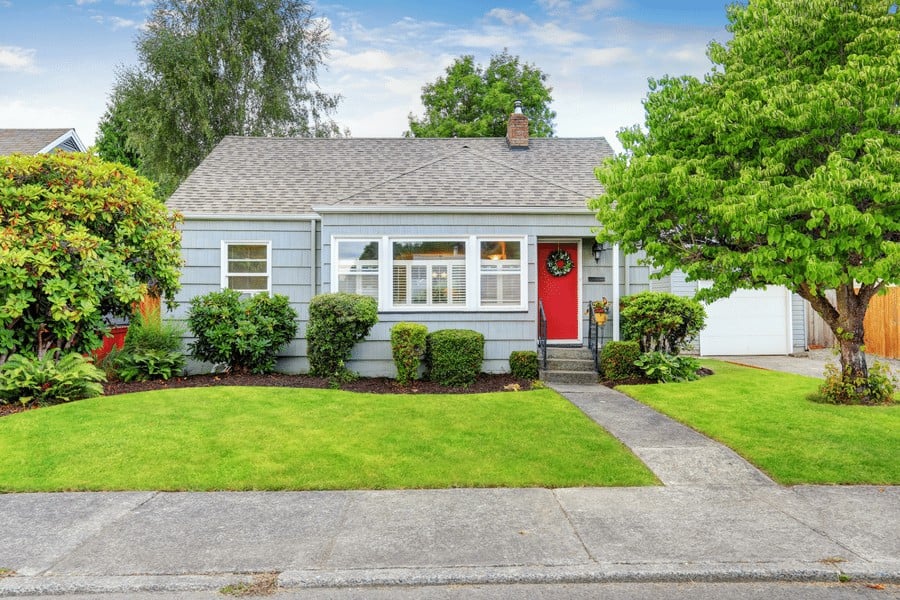Things Every First-Time Home Buyer Should Consider

Buying a house is a big deal — especially when it’s your first time. Becoming a first time home buyer is also a huge responsibility, which is why just because you’re willing and able doesn’t mean it’s the best decision for you. Luckily we have a rock star realtor here to walk us through all the things you should consider before making that step. Laura Davis is an executive broker with Remax Elite based in Conway, AR. She’s been in the real estate business for 6 years and she helped me find my first house — she also made the process as quick and painless as possible!
House Hunting
In your opinion, what are some “bad” reasons that someone is wanting to buy a house? Have you learned to recognize any signs that someone maybe isn’t ready for home ownership?
I don’t think there’s a bad reason for buying a home, it’s always a good investment. It’s always good to have your money go toward your own equity and not someone else. The people who may not be ready for ownership are those that are taking every dime they have to get in a home and they buy a home at the max price they can afford. They either need to start smaller or wait until they have some cash reserves to pay for unexpected problems. You’re always going to have repairs. Let’s say the water heater goes out. You need money to replace that.
And on that note, I would ask for a home warranty. It covers the items that home insurance doesn’t cover. So it would cover your heat and air, your garbage disposal, your microwave, etc. You could get the seller to pay for that for the first year for you, and then you could continue to pay for it for yourself.
I know you’re not the person handing out home loans, but how important is it that someone gets pre-approved before they start looking?
Always get pre-approved first. It saves everyone time. I know that’s the boring part and looking at homes is the fun part but you have to have that done to make an offer. Most sellers won’t look at an offer without a prequal letter and if it’s a hot market and you find your dream home you need to be ready to make an offer quickly. Plus it lets you know what you can afford and talking to the lender first gives you an idea of what your down payment, closing costs and monthly payment will be.
It also helps the real estate agent know what your budget is and what type of loan you’re going to get. Because the house you buy depends on the loan type as well. Some loans require all repairs be made for you, so you can’t necessarily buy a foreclosure if you don’t have the right loan type. And some loans have a fee tacked onto the loan itself, and people are kind of surprised about that. So it’s a good idea to sit down with a lender and let them pre approve you, that’s the best thing to do.
Everyone always has a list of things they envision in their dream house — I know I did — but how often are people able to find a house that checks every single one of their boxes? Should you just prepare yourself to sacrifice or compromise on something?
I’d say unless you build the house yourself and you picked out the lot for that house, you’re never going to have the perfect house. I have heard many times if only I could pick this house up and move it to another location. You always make a compromise, it never fails. You might have to give up a bathroom, closet space, storage — there’s always going to be something. But you typically end up finding the house that works for you. Something always makes up for what you’re losing. They say you feel it when you walk in, and that’s true. I’ve seen that happen many times.
On that note, how long should you plan to spend house shopping? Do you have to basically clear your schedule if you are looking to buy a house? Or can a realtor work around that?
Most real estate agents are full-time. They expect to work nights and weekends, whenever it’s convenient for you. As far as how long it takes? Let’s say you wanted to buy a house and you needed to be in it in six weeks. You could go look this weekend, you could find a house, and you could be closed in six weeks, easy. It takes about a month to do the whole start to finish loan process and that includes the inspection period and the appraisal.
And on that note, the inspection and the appraisal are two separate items. The inspection is when you hire a home inspector to inspect the property, and they will find whatever is wrong with the house and then you request for repairs to be made. The appraiser will sometimes request repairs be made — but they don’t do as thorough an inspection as a home inspector would — and they determine the value of the house. So those are the difference between the two.
Do you think that has anything to do with searching online? Looking online is an increasingly popular way to shop for houses (in fact I almost didn’t even find my house because it wasn’t listed online) — in your opinion, is this a good way to find a house?
I think it’s a great place to start actually. Everything is online. It’s rare that there’s something that’s not online. However, there are some things to know about those websites, like Zillow, Realtor.com, and Trulia. Realtor.com doesn’t have for sale by owner, and then Zillow or Trulia won’t always have every company’s listing. Because some real estate companies don’t want their listings to be on Zillow, or don’t want them to be on Trulia. So you should probably use more than one site if that’s your sole source. And then it never hurts to just drive around.
And then of course if you’re working with an agent, the agent knows everything that’s out there. So have your real estate agent send you homes because they have access to the multi-list service and they can send you links to everything. You can tell them, “I’m looking for a four bedroom, two bath house with a two car garage and a fenced yard.” And they will send you everything that’s available in your price range into an email with a link. Then you can just look through that and you know you haven’t missed anything. Also, sometimes houses will sit on those websites but they’re already sold or they’re taking backup offers. So your agent is a good source to let you know. It’s the most up-to-date.
Before you buy a house, how much money should you have saved up?
It’s possible to buy a house with no money saved. I wouldn’t advise this method because you need to be prepared for homeownership and inevitable repairs. There are several different loan types and the lender can find the best match for you. Probably the most common loan is FHA which requires 3.5% down and you’ll still have closing costs to pay on top of that. Many times the buyer will ask the seller to pay the closing costs for them. It’s important to remember that really all you’re doing is financing those costs into the loan as the seller will ask you to pay more for the house in most cases. Buyers like this option though as it requires less money upfront for them.
The common misconception is that you have to have 20% down. You don’t have to have that, you could get into a house with no money down. There are programs out there, especially for a first-time buyer who doesn’t have a big nest egg. You have to fall into all the right criteria, that’s why it’s good to talk to a mortgage person. But I would definitely have a little bit saved up, more for the emergencies that come up after you buy a home.
How to Buy a House
So once you find a house that you love, what happens next? I remember being soooo impatient about this part!
After you find the house you love, you tell your real estate agent that you’re ready to make an offer and you work through the negotiation process with the seller. Once you get the price agreed upon, then the agent will send your contract to the bank. When your bank starts working on your loan, you’ll have to give the bank all of your documents and paperwork — this is the part where it gets kind of slow and drags out. And then you’ll have the home inspection done and the bank will order the appraisal. It takes about a month for the whole process to complete from start to finish.How long does it take to close on a house? And what does that process entail?You work with our realtor to decide if the price they’re asking is in line with comparable houses and you decide on the price you want to offer.
At what point is it your house? Could the buyer take a different offer?
Typically when you write the contract and they sign it accepting it, if you don’t have any contingencies (you’re not trying to sell a house or you have no reason to back out) it’s yours from the day they sign that offer. Some people have to sell a house, so there’s what’s considered an escape clause. But that’s pretty rare, usually once you sign the contract and they sign the contract, it’s your house. They can’t take another offer. It could go pretty fast if you’ve made a good offer and they agree, it just depends on however long it takes to negotiate the offer.
How long does it take to close on a house? And what does that process entail? What about closing fees?
It typically takes 30 days to close on a home. The title company is the company where you go to close — and when I say close on a house, that just means you go and sign the final papers. Typically the buyer and the seller sign on the same day, which is your closing date. When you write a contract you pick a date that works for you. Typically the seller moves out and everything happens on that day, so everything moves towards that point in time.
Closing costs are the fees incurred from getting a loan. The title company has fees, the lender has fees, taxes, insurance, starting your escrow — all of those fees added together are your closing costs. You could ask the seller to pay your closing costs, but something that people misunderstand is that the seller is not really paying. If they pay for your closing costs, then they’re also making you pay more for the house. You’re just financing your closing costs into your loan. Which is very common. Because even if you have the money, you may not want to spend it because you might want to go buy furniture or pad your savings so you have money there for unexpected expenses.
What happens if you change your mind? When is it too late?
You have an inspection period of 10 business days after the contract is accepted to do your home inspection. If you were going to change your mind, you would want to back out within that inspection period of time. Typically most people don’t change their mind, they’re pretty sure that’s what they want to do. But if you’re going to change your mind, I’d do it pretty quick because you are going to incur expenses as a buyer. You have to pay for the home inspection and the appraisal, and those two together are at least $800 to $1,000. So you’d just be out that money if you change your mind.
And then if you waited long enough and the seller was out money for moving expenses, the seller could come after you with some legal action and ask you to cover some expenses that they incurred. But that’s rare, most of the time if something goes wrong it’s not the buyer’s fault, it’s something that happened with their loan or something out of their control.
Is the process of buying a home different if it’s a foreclosure? How does that work?
Foreclosure is just the same as a regular house purchase, the only difference is they don’t make you do repairs. So you’re buying it as is. Some loans make it harder to buy foreclosures because they want you to have the repairs made. But if it’s a foreclosure that’s in good shape and doesn’t need any repairs made you could get any type of loan for it and it goes just as smoothly as anything else. You might have to turn the utilities on, because a lot of times the power isn’t on. But it’s a process just like any other loan.
Using a Realtor
How should you choose a realtor? How do you know if your realtor really has your best interest at heart and isn’t just trying to make a sale?
Many times your friends can refer an agent to you, especially if you’re a first time home buyer. There’s nothing wrong with going online and looking at reviews because most agents have a site where you can find them. If you find someone you’re interested in, schedule an appointment to meet with them and see if your personalities mesh. Ask them what hours they work and if they’re willing to work with you. You also might just pick a few houses and spend half a day looking with them to see if you work well together. If not, then don’t sign an agreement because there’s a buyer agency agreement that you would sign with an agent.
Keep in mind that we are selling you a home, and that’s the way we get paid. But I don’t look for the superficial prettiness of the house anymore, I look at the foundation and bones of it. If I see something that really concerns me, I’ll point it out. I give you everything upfront, the negatives, the positives. Because if you call me back in three months because you hate your house and you want to sell it, I’m going to have trouble selling it too.
What should you do if you want to change realtors?
It depends on the agreement that you signed with them, if it’s something that you can get out of at that point. Many realtors don’t charge you anything to work with them, they’ll just agree that it’s not working out between you. But some agents may have some monetary penalty for the time you spent with them. They may say you owe them $500 for their gas and their time. But that will just depend on the agreement that you sign with them.
Can you buy a house without a realtor? Is there any benefit to doing it this way?
You can buy a house without a realtor but I wouldn’t advise it. You can definitely buy a house without a realtor, if it’s a for sale by owner. But if it’s listed, there’s no point because you will have to have a real estate agent involved whether it be the listing agent. I would say either way though it’s a great idea to use an agent because they know so many ins and outs of the whole process. You’re only doing this once every five or 10 years, but they do it every day. So they know how to help you out, what to look for, and they can give you advice. It’s money well spent.
In closing, do you have any general advice for young people who are hoping to be homeowners?
All first time home buyers should first talk to a lender and get the pre-qualification part completed. Then start looking at homes in person and driving around the area. Read your lease and know the terms of moving out, and save some money even though some homes you can get in with no money down it helps to have emergency funds. Even if you don’t plan to buy for a year talk to a lender now. There may be something on your credit report that takes a little while to fix and you can be working on that and be ready when you want to buy.
Last modified on January 10th, 2018









Show Comments +